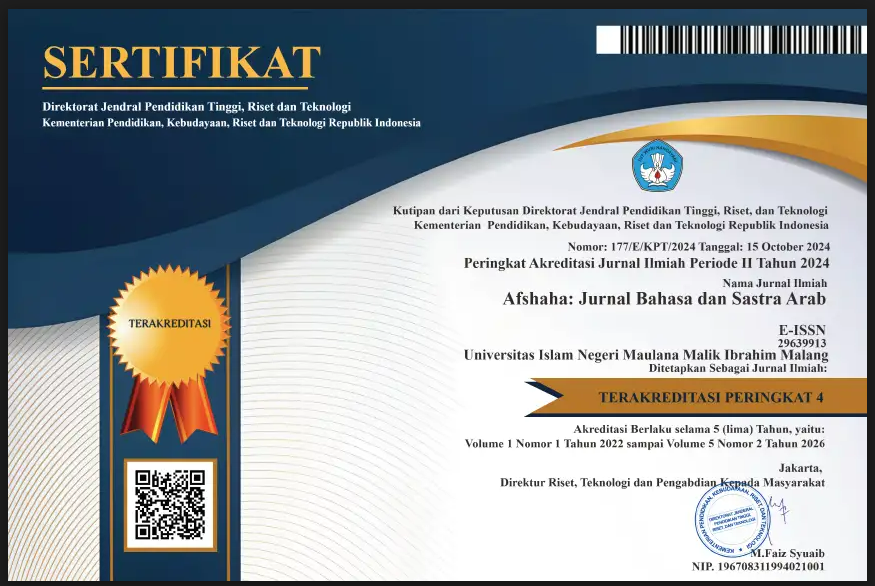SASTRA MUSLIM DAN ARAB DI AMERIKA
Abstract
Full Text:
PDFReferences
Al-abbasi, T. M.M. (2016). An Ecocritical Reading of Selected Poems by Daniel Abdal-Hayy Moore. Majallat Kuliyyat Al-Adab Jami’at Al-Fyum, 15(13), 866–888. DOI: https://doi.org/10.21608/jfafu.2016.62334
Ali, R.S. (2015). Loss of Identity in Ayad Akhta’s American Dervish. International Journal of Literature and Arts, 3(5), 80. DOI: https://doi.org/10.11648/j.ijla.20150305.13
Aminah, A.-D. (2018). Arab Culture in America. History of Arab Americans, 33–50. DOI: https://doi.org/10.5040/9798400664427.ch-003
Barakat, I. (2014). A Tribute to Naomi Shihab Nye. World Literature Today, 88(1), 46–49. DOI: https://doi.org/10.1353/wlt.2014.0243
Bazzano, E. (2020). A Shadhiliyya Sufi Order in America. In Varieties of American Sufism (pp. 85–119). SUNY Press. DOI: http://dx.doi.org/10.1515/9781438477923-006
Beaty, B., & Woo, B. (2016). Persepolis by Marjane Satrapi?. In The Greatest Comic Book of All Time (pp. 109–119). Palgrave Macmillan US. DOI: http://dx.doi.org/10.1057/978-1-137-53162-9_10
Bernstein, L. (2019). 14. Prison Writers and the Black Arts Movement. In New Thoughts on the Black Arts Movement (pp. 297–316). Rutgers University Press. DOI: http://dx.doi.org/10.36019/9780813541075-016
Beyyette, B. (2016). From Malcolm X to Generation Y: The African American Muslim Community after 1965. In Malcolm X (pp. 252–272). BRILL. DOI: http://dx.doi.org/10.1163/9789004308688_012
Considine, C. (2018). Muslims in America: Examining the Facts. Bloomsbury Academic.
Davis, M. F. (2017). Selected Writings of the American Transcendentalists. Yale University Press. DOI: http://dx.doi.org/10.12987/9780300145908
Dougherty, M. (2017). ‘Taqwacore is Dead. Long Live Taqwacore’ or punk’s not dead?: In The Web as History (pp. 204–219). UCL Press. DOI: http://dx.doi.org/10.2307/j.ctt1mtz55k.16
Ebel, J. (2018). The Islamic Lineage of American Literary Culture: Muslim Sources from the Revolution to Reconstruction by Jeffrey Einboden. Early American Literature, 53(3), 985–988. DOI: https://doi.org/10.1353/eal.2018.0089
Fadda-Conrey, C. (2014). Contemporary Arab-American literature: Transnational reconfigurations of citizenship and belonging. NYU Press.
Fadda, C. W. N. (2019). Intersections of Arab American and Asian American literature. In Oxford Research Encyclopedia of Literature. Oxford University Press. DOI: http://dx.doi.org/10.1093/acrefore/9780190201098.013.800
Febria, R., Muliastuti, L., & Rasyid, Y. (2022). Moral and Gender Identity in the Story of the Butterfly in the Mosque. Getsempena English Education Journal, 9(2), 98–110. DOI: https://doi.org/10.46244/geej.v9i2.1841
Ghufran, S. (2020). Laila Lalami’s the Moor’s Account: A lost Narrative. Smart Moves Journal IJELLH, 8(7), 29–40. DOI: https://doi.org/10.24113/ijellh.v8i7.10654
Güven, F. (2019). Resistance Narratives: A Study of H. M. Naqvi’s Home Boy. Selçuk Üniversitesi Edebiyat Fakültesi Dergisi, 42, 55–72. DOI: https://doi.org/10.21497/sefad.675018
Haque, D. (2023). Mohja Kahf. In Oxford Research Encyclopedia of Religion. Oxford University Press. DOI: http://dx.doi.org/10.1093/acrefore/9780199340378.013.889
Hassan, W. S. (2022). The Rise of Arab American Literature. In Sajjilu Arab American (pp. 308–316). Syracuse University Press. DOI: http://dx.doi.org/10.2307/j.ctv2v55b2k.33
Hilal, R. M. (2017). Marking the American landscape: African Muslim Slave Writings and the Place of Islam. Journal of the African Literature Association, 11(2), 135–148. DOI: https://doi.org/10.1080/21674736.2017.1375651
Ihmoud, S. (2021). Born Palestinian, Born Black. In Antiblackness (pp. 297–308). Duke University Press. DOI: http://dx.doi.org/10.1215/9781478013167-019
Islamic Writers Alliance, Inc. (2024). Islamic Writers Alliance, Inc. Retrieved from https://islamicwritersalliance.wordpress.com/
Iyer, D. (2017). We too Sing America: South Asian, Arab, Muslim, and Sikh Immigrants Shape Our Multiracial Future. The New Press.
Jussawalla, F. (2022). From Ismat Chugtai to Samina Ali and Monica Ali. In Muslim Women’s Writing from across South and Southeast Asia (pp. 9–22). Routledge. DOI: http://dx.doi.org/10.4324/9781003248064-3
Kabir, N. A. (2023). Islamophobia and Radicalization. In American Muslim Perspectives on Radicalization (pp. 183–230). Springer Nature Switzerland. DOI: http://dx.doi.org/10.1007/978-3-031-43795-3_4
Kahf, Mohja. (2010). Teaching Diaspora Literature: Muslim American Literature as an Emerging Field. The Journal of Pan African Studies, 4(2):163-167
Karim, P. M. (2008). Talking with a Pioneer of Iranian American Literature: An Interview with Nahid Rachlin. MELUS: Multi-Ethnic Literature of the United States, 33(2), 153–157. DOI: https://doi.org/10.1093/melus/33.2.153
Leise, C. (2022). New England “Pilgrim” and “Puritan” Cultures. In American Literature. Oxford University Press. DOI: http://dx.doi.org/10.1093/obo/9780199827251-0111
Maira, S. (2019). Muslim American Youth and Post-9/11 Islamophobia. In The Routledge International Handbook of Islamophobia (pp. 252–262). Routledge. DOI: http://dx.doi.org/10.4324/9781351135559-21
Marcoux, J.-P. (2018). Amiri Baraka (LeRoi Jones). In American Literature. Oxford University Press. DOI: http://dx.doi.org/10.1093/obo/9780199827251-0187
Miswari, M. (2018). The Kite Runner of Khaled Hosseini. At-Tafkir, 11(2), 92. DOI: https://doi.org/10.32505/at.v11i2.738
Mohsen, H. Y. A., Hashim, R. S., & Asqalan, Z. I. S. (2016). Moving Towards Home: An Ecofeminist Reading of Suheir Hammad’s Born Palestinian, Born Black. Asian Social Science, 12(8), 33. DOI: https://doi.org/10.5539/ass.v12n8p33
Najmi, S. (2015). Narrating War: Arab and Muslim American Aesthetics. In The Cambridge History of Asian American Literature (pp. 519–534). Cambridge University Press. DOI: http://dx.doi.org/10.1017/cho9781107284289.031
Nayeri, D. (2024). A Teaspoon of Earth and Sea. https://www.goodreads.com/book/show/15814104-a-teaspoon-of-earth-and-sea (Original work published 2024)
Noori, F. (2021). Agha Shahid Ali. In The World of Agha Shahid Ali (pp. 51–69). SUNY Press. DOI: http://dx.doi.org/10.1515/9781438484334-009
Oumlil, K. (2021). The Poetry of Suheir Hammad: Transnational Interventions in the Age of Islamophobia and Digital Media. Islamophobia Studies Journal, 6(1). DOI: https://doi.org/10.13169/islastudj.6.1.0093
Quealy-Gainer, K. (2022). This Woven Kingdom by Tahereh Mafi. Bulletin of the Center for Children’s Books, 75(5), 158–159.DOI: https://doi.org/10.1353/bcc.2022.0026
Rana, S. (2020). Superman of America vs. Ameen Rihani. In Race Characters (pp. 42–65). University of North Carolina Press. DOI: http://dx.doi.org/10.5149/northcarolina/9781469659473.003.0002
Smethurst, J. (2019). The Black Arts Movement and Historically Black Colleges and Universities. In New Thoughts on the Black Arts Movement (pp. 75–91). Rutgers University Press. DOI: http://dx.doi.org/10.36019/9780813541075-005
Smith, M. J. (2016). Mutabaruka. In African American Studies Center. Oxford University Press. DOI: http://dx.doi.org/10.1093/acref/9780195301731.013.74641
Srikanth, R. (2019). Reading South Asian American Literature. In Oxford Research Encyclopedia of Literature. Oxford University Press. DOI: http://dx.doi.org/10.1093/acrefore/9780190201098.013.872
Strank, W. (2023). Taqwacore: The Birth of Punk Islam. Kieler Beiträge Zur Filmmusikforschung, 5(4), 618–622. DOI: https://doi.org/10.59056/kbzf.2011.5.p618-622
Taha, A. A. (2018). Arab-American Diaspora and the “Third Space”: a Study of Selected Poems by Sam Hamod. English Language and Literature Studies, 8(2), 29. DOI: https://doi.org/10.5539/ells.v8n2p29
Valente, C. M. (2024). Pamela K. Taylor. Retrieved from https://www.goodreads.com/author/show/4443517.Pamela_K_Taylor
Vinson, P. H. (2022). Arab American Literature. In Oxford Research Encyclopedia of American History. Oxford University Press. DOI: http://dx.doi.org/10.1093/acrefore/9780199329175.013.987
Yusuf, I. (2024). Iman Yusuf’s Islamic Romance Site. Retrieved from https://www.angelfire.com/pa5/halalove/
Zheng, J. (2021). Sonia Sanchez. In With Fists Raised (pp. 65–84). Liverpool University Press. DOI: http://dx.doi.org/10.3828/liverpool/9781800859777.003.0004
DOI: https://doi.org/10.18860/afshaha.v3i1.23479
Refbacks
- There are currently no refbacks.
Copyright (c) 2024 Afshaha: Jurnal Bahasa dan Sastra Arab

This work is licensed under a Creative Commons Attribution-ShareAlike 4.0 International License.
Member of:
Indexed by:
Editorial Office
Faculty of Humanities, Universitas Islam Negeri Maulana Malik Ibrahim Malang
Jalan Gajayana 50 Malang, Jawa Timur, Indonesia 65144
Phone (+62) 341 551354, Facsimile (+62) 341 572533
e-mail: afshaha@uin-malang.ac.id

Afshaha: Jurnal Bahasa dan Sastra Arab by Faculty of Humanities Universitas Islam Negeri Maulana Malik Ibrahim Malang is licensed under a Creative Commons Attribution-ShareAlike 4.0 International License.
Afshaha: Jurnal Bahasa dan Sastra Arab, e-ISSN: 2963-9913











